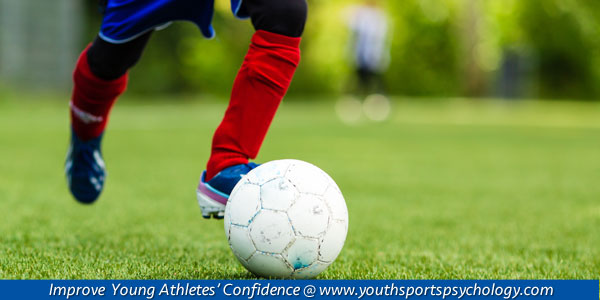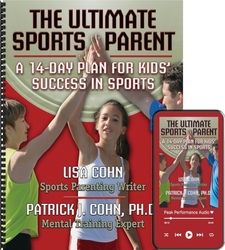
Top 4 Sports Parents’ Mistakes
Lisa and Patrick Cohn here to tell you we’re guilty…
We’ve committed some of the Top 4 Sports Parents’ Mistakes, which we cover below.
Even though we know the dangers of making these mistakes, when we’re feeling especially excited for or worried about our sports kids, we commit these no-nos. And then we see the negative results our actions have on our kids.
For example, Lisa committed a mental game no-no just this morning. While taking her dancer to the second day of an important audition, Lisa spent the whole car ride asking her dancer to compare her performance yesterday with the other dancers’ performance….
“How did Mattie look? Did anyone screw up? How did the coach react after she saw you perform, compared to how she reacted to the others’ performance? Was there anyone there who was better than you?”
Lisa’s dancer turned on the radio and said she didn’t want to talk. But clearly Lisa’s comments only increased her dancer’s anxiety.
Bad Lisa.
The point is, we’re all human. But if we’re equipped with helpful information, at least we can TRY to avoid making these mistakes.
So here are our top four sports parents’ mistakes, based on our soon-to-be-released program, “The Confident Sports Kids: A 7-Day Plan for Building Self-Confidence in Young Athletes.”
We’ll have copies of our new program very soon, and it will give you these tips and many more:
1. Avoid comparing your kids to other athletes.
All this does is psyche them out. Even if you’re saying they’re better than all the others. They need to focus on their own strengths—not on what other kids are doing.
2. Don’t place high expectations on your kids.
Avoid saying things like, “You should be the top scorer out there today.” or “I want you to make 5 threes today!” Kids take these expectations seriously, and when they don’t meet up to them, they become frustrated. This busts their confidence.
3. Don’t over-analyze your kids’ performance—especially before games.
If you fill their heads with a ton of detail, they’ll only get confused. And up tight. They need to be able to rely on their training and re-act quickly and intuitively to what’s happening. They don’t need to be thinking about your detailed instructions regarding their stance, how they hold their heads and where they should point their feet when running toward the ball.
4. Avoid focusing on kids’ failures.
That means censor yourself when you’re tempted to say things like, “Don’t double-fault today,” or “I hope you don’t commit any turnovers” or “Remember how nervous you were when you last tried out for this team?” When kids focus on failures, it hurts their confidence. They need to keep their self-talk positive.
Okay, it’s your turn. Please visit our blog and give us your confessions, comments and questions. All of this will help us help you better with our “Confident Sports Kid” program.
Do you commit these mistakes? How do your kids react? Are there other sports parent blunders us adults should avoid?
We’ve had lot’s of concerned parents posting comments on our blog. Please join the conversation on our blog by posting below.
P.S. We’re standing by, waiting to hear from you. Fess up. What mistakes do you make, what mistakes do the sports parents around you make? How do these no-nos affect kids? This will help us put the finishing touches on our “The Confident Sports Kid” program. Sound off today…
Related Articles on Youth Sports:
- Teaching Sports Kids Pregame Plans
- How to Turn Pregame Jitters into a Positive
- How to Help Kids Cope With Mistakes
*Subscribe to The Sports Psychology Podcast on iTunes
*Subscribe to The Sports Psychology Podcast on Spotify
Help Young Athletes Boost Confidence in Sports!
Every day, we receive letters from parents like you who want their children and teens to excel in sports. However, these parents can see fear, doubt, and frustration on the faces of their kids who struggle with the “inner” game of sports. But these parents have no idea how to help their kids overcome the worries, expectations and self-defeating thoughts that prevent their young athletes from feeling confident and successful.
You can benefit from our 15-plus years’ of work in sports psychology and sports parenting research. Now, you can tap into our secrets to sports success through a cutting-edge, 14-day program that helps young athletes overcome the top “mental game” challenges that sports parents face—and the top challenges young athletes face.


Some coaches don’t always know as much as the parents concerning a specific sport. You only want what is best for your child. When a coach teaches a technique or drill incorrectly, it is hard not to want to make corrections. I know that it is best to explain to your child that the technique is what the coach was taught or how the coach wants to teach. My biggest mistake is questioning the coaching or techniques displayed by coaches. I will admit that my kids do not compete on elite levels and most of the coaches are volunteers. I just want them to learn proper techniques and methods. Sometimes it is harder to correct bad habits and techniques than to follow sound fundamental drills.
Hi Lisa and Patrick,
Thanks for your emails. I have a 12 year old son Brandon who has had a passion and gift for golf and a 10 year old son who has found a passion for basketball and is an amazing ball player for just beginning. They are both amazing athletes and love their individual sports. I have been discovering just recently that my 12 year old has been getting annoyed with me when I ‘brag’ about him to other people. For instance, the other day a father on my son Patrick’s team came up to me and started talking about Brandon and golf. He is a former pro baseball player and know about Brandon’s golf talent. I was telling him that for the first time we think we may need to get him golf pro lessons and want to make sure that we get him the right pro to help him moving into adolescence. Somehow we started talking about tournaments that Brandon played in and I said, “He golfed at Torrey Pines and loved that course.” Later, Brandon said, “Mom, I hate when you say things that aren’t right, like when you said I golfed at the course. It’s not “golfed at” it’s “played at”. “I don’t when you tell people how good I am either.” I was pretty humbled after he said that. I apologized and he understood and smiled in love at me. I explained that I would work on not ‘bragging’ about him and turn the conversation over to him when he was there so he could tell his own story. He is a very humble and sweet young man and now that he is reaching adolescent age, I need to step back and let him speak for himself. He’s been struggling off and on with his game and we were told that around this age, kids start to need to find a pro to take over where parents left off. It looks like the time is here so we are going to start doing that dance of being a parent and try to read when we lead and he leads. Another mile stone in parenting 🙂 Suzan
On 1 and 3, guilty as charged. I always used to try and encourage Storm (my 13-year field hockey daughter) by telling her that she’s better than the rest. Actually I still believe that after seeing yesterday’s practice! But if you folks recon that we should not compare her abilities to those of others, then so be it. Whatever it takes.
We’ll just stick to playing music or chatting on the way there about whatever topic she wants to.
I suppose the main point here is: rely on your practice. What you don’t have on the day of the game, you simply don’t have.
What I do try, however, is to always tell her to have fun and enjoy herself. I know that for her being in a team that has bonded properly is more important than winning or losing.
Vaughn
Number four is my pet peeve in more than fifty years of coaching, hearing instructions of “The
reverse of an Idea.”
One of my pet peeves. Instruction should be what you want done not what you don’t want done. You want the athlete to concentrate on what is to be done.” The reverse of an Idea.” Tell a person long enough how terrible they are and eventually they will begin to believe it. An old “Adolf Hitler” philosophy, tell the people long enough and often enough and they begin to believe it, true or not true, right or wrong.As much as possible keep corrections Positive.
Wow, thanks so much for this! I live in dreaded fear of becoming that terrible sports mom, or stage mom, that everyone hates… including me!! lol. Seriously though, this is good advice. Thanks so much for sharing it!
I’m a goalie mom – my 8 yr old son plays for a select travel team. I am guilty of getting annoyed with him in the locker room (pre-game) if he is cutting up and talking too much while I’m getting his pads strapped on his legs. The coaches want the kids to focus. I think my expectation that he display pre-game focus come across as impatient, intense parenting. However, our message to him is consistent – “have fun, its just a game, enjoy this time with your friends/team.” The passion he has comes from within. Balancing that passionate energy with discipline is where we display parental intensity in our communication. Its a learning curve.